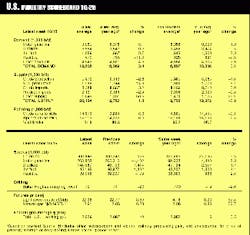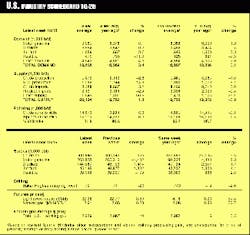OGJ Newsletter
null
OPEC countries are keeping an eye trained closely on oil markets, awaiting signs of a stable recovery.
Saudi Arabia's minister of petroleum and mineral resources, A* I. Al-Naimi, offered his views on world oil markets in Houston last week. Naimi:
- Regretted volatility in the price of crude oil, saying "fluctuations of more than 10% are not a healthy sign."
- Noted that few market observers agree on "the right price" of crude oil but that, when the oil price fell to $10/bbl last year, "all of us in the oil industry, and outside as well, knew it was the wrong price."
- Estimated that the current price of oil includes $2-4/bbl that is "psychologically driven rather than demand-driven."
- When asked whether OPEC might raise production quotas before its next ministerial meeting in March, answered, "From where we stand now, I would say absolutely not-right now." Inventories, he said, remain too high.
Al-Naimi told the Houston Forum why his country seeks foreign investment in downstream projects but not exploration and development. "We already have plenty of reserves and idle (production) capacity," he said. "We need integrated projects where each link of the chain adds value." He said Saudi reserves of 261 billion bbl could jump to 400 billion bbl with enhanced recovery, and output can be pushed to 10.3-10.5 million b/d within 90 days.
Al-Naimi said he hoped negotiations could begin by the end of 1999 on some of the proposals from foreign investors now under study.
OPEC Conference Pres. and Qatari Minister of Energy and Industry Abdullah Bin Hamad al Attiyah is also keeping an eye on global oil stocks (see related story, p. 26). Speaking in Doha, he said, "If the present trend continuesellipsestocks may witness a considerable fall during the next 5 months." Al Attiyah said OPEC and its non-OPEC "friendsellipsewant to watch market trends and ensure that we get a fair and reasonable price for our oil exports."
Meanwhile, a PDVSA official told reporters in Caracas that the state firm will boost its output capacity by 6% in 2000 so that it can boost production quickly if OPEC votes to relax output restraints. PDVSA will increase its oil production capacity to 3.55 million b/d from the current 3.25 million b/d.
Officials of the Colombian government were in Houston last week to promote US investment in the country's oil projects. As OGJ went to press, the delegation was explaining its revised licensing, royalty, and contract terms. The revisions were expected to include: a reduced share in production offtake for Ecopetrol, a sliding royalty scale, and an improved cost-recovery scheme.
The US Gulf of Mexico rig market continues to show slow signs of strengthening, according to Global Marine. The drilling company's summary of current offshore rig economics (SCORE) for the gulf rose 2.5% in September.
"As expected, the recovery in offshore drilling continues to be uneven. Strong demand and increasing day rates are being reported in the US Gulf of Mexico," said Chairman Bob Rose. "Such disparities are typical in the early stages of a recovery but tend to be arbitraged over time. The US Gulf of Mexico has already attracted a number of rigs from other regions, which should cause those markets to strengthen sooner." The global SCORE for September made a modest gain, inching up by 0.3%. The Gulf of Mexico rise was offset by declines in activity in the North Sea and Southeast Asia. "Meanwhile, the West Africa market appears to have bottomed," said Rose, "and leading indicators suggest an improving supply and demand balance in the coming months."
BP Amoco has opted to support the controversial Baku-Ceyhan pipeline route for Caspian-region oil exports, according to Reuters reports.
The US-Azerbaijan Chamber of Commerce (USACC) said it learned that the BP Amoco-led Azerbaijan International Operating Co. consortium "is reportedly ready to endorse the route's construction through a package of proposals that include committing 2 billion bbl of its early oil (production) to the MEP (main export pipeline) and constructing the Baku-Supsa section of the pipeline. Turkey would undertake the construction of the remaining section of the pipeline through its territory. Such an arrangement would ease Turkey's earlier concerns regarding responsibility for out-of-country risks and facilitate its decision to cover expenses for construction within Turkey," said USACC. The chamber said it expects the World Bank to finance the MEP, although other observers are less sanguine, stressing that the project's economics remain highly questionable.
Evidence that Russia's new production-sharing agreement legislation might restart its stalled program of big investments by foreign majors came as OGJ went to press (OGJ, Oct. 18, 1999, p. 36). Lukoil and Conoco announced that their proposed Northern Territories Block project, which will be based around development of giant Yuzhno Khilchuyu field in the Timan-Pechora region, passed its third and final reading by the Duma. The project will now pass into legislation on the government's list of fields eligible under PSA deals.
Conoco sees the project-thought to have potential reserves of 1.3 billion bbl of oil-as a means to build on its earlier Polar Lights development.
Ireland's Seven Heads oil and gas find, which lies in 330 ft of water about 32.5 km west-southwest of the Marathon-operated Kinsale Head gas field off the south coast, is being mooted as a development prospect 25 years after it was found by Esso. Ramco Energy, Duke Engineering & Services, Island Petroleum Developments, and Sunningdale Oil secured an 18-month "licensing option" to study existing data on the find. The firms will evaluate four wells drilled by Esso and Marathon during 1974-90, each of which recorded significant oil and gas shows. Ramco says much has changed since the strike, and Ireland now has a robust market for gas. The company will focus on the evaluation, estimation, and deliverability of the Seven Heads gas reserves.
Elf and partners have made a seventh major discovery on Block 17 off Angola. On test, the Cravo-1 well, drilled in 1,357 m of water between Lirio and Rosa fields, flowed 12,800 b/d of 34° gravity oil (see map, OGJ, Oct. 18, 1999, p. 38). Further geological and engineering studies are planned, says Elf.
California Gov. Gray Davis has signed a bill relaxing the timetable for removal of MTBE from California gasoline. The new bill calls for a phase-out of MTBE "as soon as possible," rather than by Dec. 31, 2002, and toughens inspection regulations for underground storage tanks (OGJ, Apr. 5, 1999, p. 39).
Oxygenate proponents say the new bill acknowledges that the original timetable could have caused gasoline price hikes, supply shortages, and air-quality deterioration. The Oxygenated Fuels Association, the American Methanol Institute, and environmental organizations helped write an amendment to the bill calling for the prevention of backsliding on air-quality gains achieved to date.
At AMI's annual meeting in Houston last week, AMI CEO John Lynn hailed the bill's signing as a success for the methanol industry: "When I look at where we were last Marchellipseand where we are today, I feel good. I certainly don't feel like folding my tent and walking away." He expects continued and more-aggressive challenges to the use of MTBE, however. In the next year, AMI will continue to divide its resources between defending MTBE use and expanding new market opportunities for methanol, particularly for fuel-cell vehicles, he said.
In a move that seems to ignore the chemical reaction of combustion, 16 environmental groups have petitioned the US EPA to regulate emissions of carbon dioxide and three other greenhouse gases from new motor vehicles.
Led by the International Center for Technology Assessment, they based their petition on a section of the Clean Air Act that requires EPA to regulate emissions that meet the CAA definition of "air pollutant" and may reasonably be anticipated to endanger human health or welfare.
Tokyo prosecutors have arrested nine officials of seven Japanese oil companies on suspicion of rigging bids for fuel supply contracts with the Defense Agency (OGJ, Oct. 18, 1999, Newsletter). The Tokyo District Public Prosecutors Office arrested two officials each from Nippon Mitsubishi and General Sekiyu, and one each from Cosmo Oil, Showa Shell Sekiyu, Idemitsu Kosan, Japan Energy Corp., and Kygnus Sekiyu.
Prosecutors believe that Yuki Yamamoto, the arrested Cosmo Oil official, played the role of a go-between for the oil firms and the Central Procurement Office. However, most of the arrested officials reportedly denied the bid-rigging charges and insisted that they only followed the Defense Agency's instructions.

